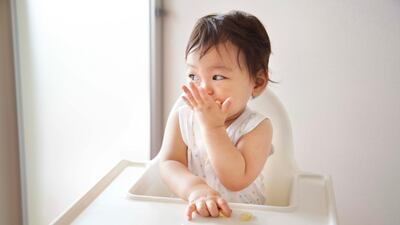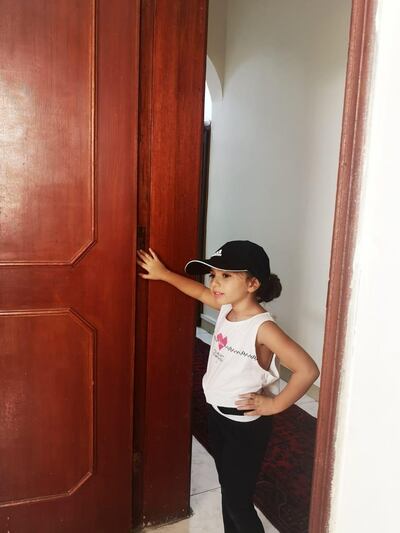One of the most common reasons children have accidents in the home is because parents are not updating child-proofing measures, experts say.
According to a 2018 report by Statistics Centre – Abu Dhabi, more than 40 per cent of deaths resulting from fatal injuries among children aged between 4 and 17 can be predicted and prevented.
“Accidents keep happening as the potential risk factors of a 1-year-old are vastly different from that of a 5 or 10 year old,” said Hanadi Saleh Al Yafei, Director of Sharjah’s Child Safety Department (CSD).
“As children grow, improvements must be made on a continuous basis which, quite often, does not happen.”
Although it may not be possible to ever completely child-proof a home, it is possible to reduce the chances that accidents will happen.
“By paying more attention, making a few changes to the home as may be necessary, and always monitoring their children, parents can dramatically reduce accidents,” said Ms Hanadi.
Working from home during the pandemic has added to parents' responsibilities as attention is often needed in two places at once.
“This may distract or reduce the attention span of parents, and accidents are most likely to occur when this happens.”
One in six deaths among children below the age of 4 is caused by a home accident, the 2018 report revealed.
For children aged between 4 and 7, one in three deaths happens at home.
Injuries caused by home accidents are the second leading cause of death among children.
Educating parents
To highlight the importance of home safety, 85 workshops and activities for more than 12,700 children and parents were held by CSD last year.
“CSD focused all efforts on helping families navigate the safety concerns for their children’s physical and emotional wellbeing as they began to spend longer hours at home.”
In May, three workshops took place as part of the 12th edition of the Sharjah Children’s Reading Festival.
During the face-to-face lectures, 30 children aged between 6 and 12 were taught the basics of home safety and accident prevention, cyber safety and learned about the UAE’s child protection law.
Attendants were also shown how to use first aid kits and fire extinguishers.
“We continued to organise virtual workshops this year which enabled us to reach a much wider audience,” said Ms Hanadi.
“It is common for parents to either overestimate a child’s intelligence or underplay what they can do – these lapses in judgement tend to have far-reaching consequences.”
How to keep your child safe
Harmful ingredients such as medicine, cleaning products and other chemicals must be kept out of children’s reach, she said, and to reduce the risk of falls, drowning and electric shocks, all doors, windows, balconies and electrical outlets must be secured.
“Look out for items that could potentially fall on children, such as heavy books and bookshelves, or sharp-edged and plastic objects that can injure or cause a child to choke,” said Ms Hanadi.
“Home safety needs to continue to evolve, therefore I encourage parents to go the extra mile and educate themselves on fire drills, CPR, and first-aid skills.”

Learning from mistakes
Shireen Al Musallami and her husband, both from Jordan, have taken child safety tips more seriously after their son, 7, was injured.
“It happened in 2017 when my elder son accidentally slammed the door while Mohammed was placing his fingers between the door and its frame,” she said.
The boy’s thumb was badly injured.
“Thank God the bone was not fractured, doctors had to stitch the finger from all sides and it healed properly.”
Following this, all apartment doors were fitted with slow-release closers to prevent them from slamming, even if shut violently.
“I made sure all dangerous tools were not in reach and changed the dining table’s location from near the window to the side of the living room,” said Ms Shireen.
Danger zones in the home
Dr Ammar Al Hakim, Head of PICU at Sheikh Khalifa Medical City hospital, said kitchens and bathrooms, in particular, should be red zones for toddlers.
“Children are curious. They want to explore, which is the reason for the majority of accidents that are in fact preventable,” he said.
“If you see your child near the kitchen or bathroom, leave everything in hand and take the baby away.”
Dr Al Hakim also urged parents to master first aid skills.
“We see many cases of kids getting burned and first aid, which is in this case keeping the affected part in cold water for at least 15 minutes, makes our job as doctors easier.”
They also treat children that have swallowed chemicals, like cleaning detergents, batteries and magnets.
“All of these accidents are preventable simply by keeping the source of danger far from kids reach.”
Dr Al Hakim called on parents to keep chemicals that do not have a stinging taste away.
“These are like chemicals used to unclog pipes, they are far more dangerous because kids tend to drink more.”



